#me a lit student whose sem just ended: wow it's time to do more lit analysis
Text
欲 (greed): in which I talk about the haikyuu music score and inevitably ended up doing linguistic analysis
I’ve been meaning to make a post about this particular track in the haikyuu score + its thematic significance for a while but I was inspired by this post by @suckishima so i’m finally doing it!
In the scene in 4.03, where Hinata’s leaving the first day of the training camp and calls Coach Ukai, the track is titled 「欲」 (yoku), or greed. Even looking at the title, the character is the root kanji for some of the major themes in the series: greed as in ambition and will (意欲 iyoku), as in appetite (食欲 shokuyoku), as in desire (it’s the kanji in 欲しい hoshī, “want”).
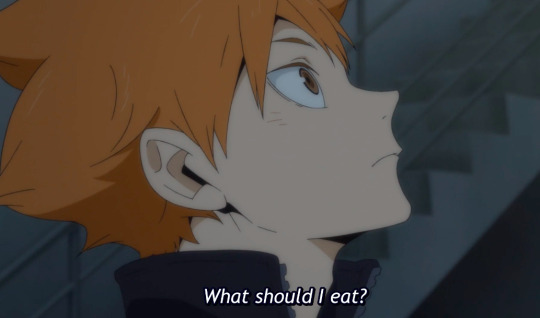
Which is so appropriate for this scene, because Hinata wasn’t chosen to be there. He’s been creating chances for himself since middle school, and still, uninvited to the training camp, he’s determined to keep getting better. And here, as he talks about nutrition and the body, it’s overlaid with this track that goes all the way back to season 2.
The first time we really hear 「欲」 it’s in 2.05, the episode of their Nekoma practice match and the big fight between Hinata and Kageyama. Its appearance marks the pivotal moment where Hinata starts expressing his desire to improve as an individual and evolve beyond the closed-eye quick they’ve developed. And it’s that hunger that motivates him to do more. (also significant is that with each development of the quick, both in s1 and s2, it’s Hinata’s drive that pushes Kageyama to his limits and convinces him to try, but that’s for another post)
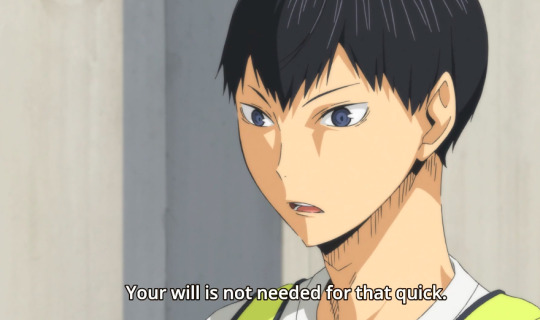
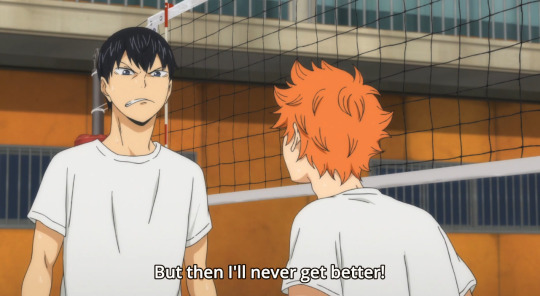
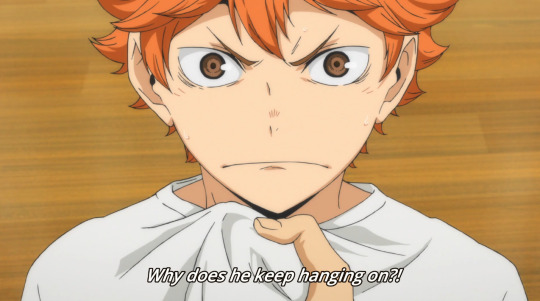
I went to listen to Asahi’s line from this episode again: “At this rate, I’m going to be eaten up by Hinata, whose greed keeps growing”. If my hearing is correct, he says: このままでは、ひたすら胴欲に成長続ける日向に食われる。(konomamadewa, hitasura douyoku ni seichou tsuzukeru Hinata ni kowareru)
The English translation is good, but there’s actually something interesting going on here. Asahi describes Hinata’s greed as hitasura, “single-minded/earnest”. Not only that, but he uses “胴欲” douyoku for greed, dou, if I’m not wrong, also being the word for body.
「欲」 appears several times, mainly following Hinata’s arc in the second season, and isn’t heard a lot afterwards. So besides the “coach, what should I eat?” moment, I think my favourite use of this track might be when it’s finally brought back in the Shiratorizawa match (3.08) because it sets up such a good parallel to the first time the track is used. It sets Coach Washijou as a foil to Hinata — we know they’re both shorter players and that’s what the narrative clearly tells us, but I love that the music specifically draws us to Hinata’s arc that begins in 2.05, and what he says way back in the first season:
It doesn’t matter if I’m cut out for it or not. I’m going to battle with this body, win and win, and be on the court as long as I can.
This line from 1.04(? just before they develop the first quick) already draws attention to drive and ambition in relation to the body. So this moment from 3.08...
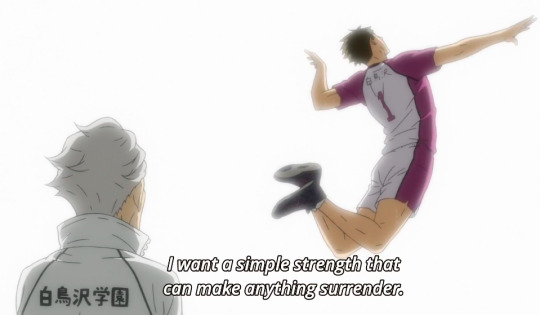
((This part of the track is so good and I could talk about the leitmotif here that appears in other tracks like Above and Haikyū!! and tbh even Greetings but i think I’ll nerd out about it in another post))
...shows us the key difference setting Washijou and Hinata apart: hunger (and again specifically re: the body). Washijou doesn’t “want a way to fight even thought [he’s] small”. He envies but admires larger/taller players. But none of that matters because he doesn’t have that “simple strength” and won’t get it, which plainly marks the end of the line for him. Hinata wants to fight “with this body”, and so his hunger is different, it goes beyond wanting. It’s endless, both in its desire and its potential. Him constantly desiring and being willing to find ways to improve means his potential for growth is boundless. In fact, going back to Asahi’s comment about “single-minded/earnestness”, you could say that is Hinata’s “simple strength”.
And with the music then containing all these narrative ideas, those ideas are brought back and built upon every time 「欲」 plays. This is exactly what happens in 3.08 and 4.03, where the motifs of drive and hunger combine even more prominently.
anyway I’m really interested to see how the track is used going forward
#me a lit student whose sem just ended: wow it's time to do more lit analysis#RIP this got SO LONG#hq!!#hq!! meta#haikyuu meta#hinata shouyou#*mine#marc.txt#long post
135 notes
·
View notes